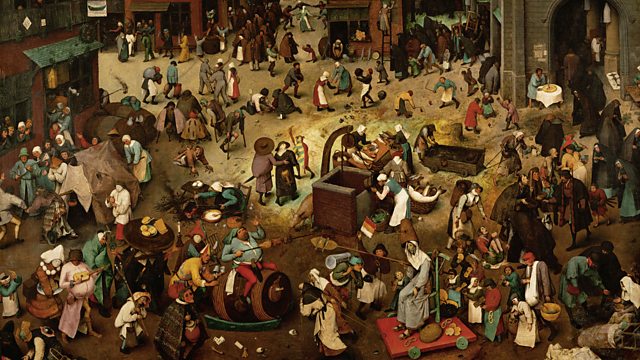
The Fight Between Carnival and Lent
A sequence of poetry, prose and music inspired by The Fight Between Carnival and Lent, a 1559 oil painting by Pieter Bruegel the Elder. Readers: Jenny Agutter and Peter Wight.
Jenny Agutter and Peter Wight with readings and music inspired by the 1559 oil painting by Pieter Bruegel the Elder. The painting depicts the folk traditions surrounding Carnival and Lent in the German lands in the early decades of the Reformation. The selection of music and readings explores the more universal struggle, between the desire to eat, drink, and let lose, embodied in Carnival, and the spirit of restraint and self-control personified in Lent. Including readings from Rabelais, Baudelaire, Donne, and Emily Dickinson, and music from Verdi, Mozart, Bach and Penderecki.
Producer: Luke Mulhall.
First broadcast in May 2017 as part of Radio 3's Breaking Free season of programming exploring the impact of Martin Luther's Revolution.
Last on
Music Played
Timings (where shown) are from the start of the programme in hours and minutes
-
![]() 00:00
00:00Johann Sebastian Bach
The Art of Fugue, BWV 1080 - Contrapunctus 1
Performer: Academy of St Martin in the Fields, Sir Neville Marriner (Conductor).- Philips 4425562.
- CD1 Tr1.
-
![]() 00:00
00:00Johann Sebastian Bach
Art of Fugue: 14th Contrapunctus
Performer: Keller Quartet.- Bach: Art of Fugue.
- ECM.
-
John Donne
Batter my heart, three persond God, read by Jenny Agutter
![]() 00:04
00:04Johann Schelle
Durch Adams Fall
Performer: La Capella Ducale, Musica Fiata, Roland Wilson (Conductor).- CPO 999 841-2.
- Tr5.
Rebecca Lindenberg
Carnival, read by Peter Wight
![]() 00:07
00:07Wolfgang Amadeus Mozart
Symphony No.40, K.550; I. Molto allegro
Performer: Berliner Philharmoniker, Herbert von Karajan (Conductor).- EMI CDM5661002.
- Tr1.
Gospel of St Luke, KJV
4:1 4, read by Jenny Agutter
![]() 00:15
00:15Karol Szymanowski
Stabat Mater op.53; 4. Spraw, niech p?acz? z Tob? razem. Moderato
Performer: ������̳ Symphony Chorus, ������̳ Symphony Orchestra, Edward Gardner (Conductor).- Chandos CHSA5123.
- Tr4.
Robert Herrick
To Keep A True Lent, read by Jenny Agutter
![]() 00:19
00:19Johann Hermann Schein
Cantional, Vom Himmel hoch, da komm ich her
Performer: Cantus Cölln, Konrad Junghänel (Conductor).- Deutsche Harmonia Mundi 05472773592.
- Tr9.
Friedrich Nietzsche
The Birth of Tragedy, read by Peter Wight
![]() 00:26
00:26Robert Schumann
Carnaval, op.9; Préambule
Performer: Stefan Vladar.- Harmonia Mundi HMC 901890.
- Tr13.
Mikhail Bakhtin
Rabelais And His World, read by Peter Wight
![]() 00:30
00:30Bob Dylan
Rainy Day Woman #12 And 35
Performer: Bob Dylan.- CBS ? CDCBS 22130.
- Tr1.
Charles Baudelaire
Be Drunk, read by Peter Wight
![]() 00:33
00:33Giuseppe Verdi
La Traviata, Libiamo ne lieti calici (Brindisi)
Performer: Rolando Villazón, Anna Netrebko, Wiener Philharmoniker, Carlo Rizzi (Conductor).- Deutsche Gramaphon 4775933.
- CD1 Tr3.
![]() 00:36
00:36Johann Sebastian Bach
Musikalisches Opfer, BWV 1079; Canon 2 a 2 violini in unisono
Performer: Academy of St Martin in the Fields, Sir Neville Marriner (Conductor).- Philips 4425562.
- CD 2 Tr8.
Emily Dickinson
I taste a liquor never brewed, read by Jenny Agutter
![]() 00:37
00:37Johann Sebastian Bach
Musikalisches Opfer, BWV 1079; Canon 1 a 2 (Canon cancricans)
Performer: Academy of St Martin in the Fields, Sir Neville Marriner (Conductor).- Philips 4425562.
- CD 2 Tr7.
James Stephens
A Glass of Beer, read by Peter Wight
Anonymous
The Drunk Poem, read by Peter Wight
![]() 00:39
00:39Gyorgy Ligeti
Musica ricercata, Adaptation for Barrel Organ; IV. Tempo de Valse (pocco vivace à lorgue de Barbarie)
Performer: Pierre Charial (Organ, Barrel).- Sony Classical SK62310.
- Tr10.
George Herbert
The Invitation, read by Jenny Agutter
![]() 00:42
00:42Johann Sebastian Bach
Magnificat, BWV 243; 1. Magnificat, tutti
Performer: Ricercar Consort, Philippe Pierlot (Conductor).- Mirare MIR102.
- Tr1.
Aelred of Rievaulx
A Rule of Life for a Recluse, read by Jenny Agutter
![]() 00:47
00:47Olivier Messiaen
LAscension - (ii) Alléluias Serein D'Une Âme Qui Désire Le Ciel
Performer: Kevin Bowyer (Organ of Salisbury Cathedral).- Continuum CCD1011.
- Tr5.
Rabelais
Gargantua & Pantagruel, read by Peter Wight
![]() 00:54
00:54Armstrong, Lillian Hardin/Raye, Don
Struttin With Some Barbecue
Performer: Louis Armstrong and His Hot Five.- ������̳ Records And Tapes ? ������̳ CD 597.
- Tr7.
Lonnie Hicks
Gluttony & I, read by Peter Wight
![]() 00:59
00:59Franz Schubert
String Quartet No.14 in D minor Death & the Maiden D810; IV. Presto Prestissimo
Performer: Ehnes Quartet.- ONYX ONYX4163.
- Tr4.
Anonymous
Second Worcester Sermon, read by Jenny Agutter
![]() 01:04
01:04Krzysztof Penderecki
St Luke Passion, Part II; Popule Meus (Improperia)
Performer: Warsaw National Philharmonic Choir & Orchestra, Antoni Wit (Conductor).- NAXOS 8 557149.
- Tr16.
Gerard Manley Hopkins
Easter Communion, read by Jenny Agutter
![]() 01:09
01:09Richard Wagner
Parsifal, Vorspiel Prelude Nicht Dank! Ha, ha! Was wird es helfen?
Performer: Orchestra & Chorus of the Mariinsky Theatre, Valery Gergiev (Conductor).- Mariinsky MAR 0508.
- CD1 Tr1.
Producer's Note: The Fight between Carnival and Lent
��
This programme was produced to contribute to Radio 3’s series Breaking Free: Martin Luther’s Revolution, marking the 500th anniversary of the start of the Reformation.�� Pieter Bruegel the Elder’s painting of 1559, The Fight Between Carnival & Lent, depicts the religious traditions and tensions in the northern German lands in the decades following the start of the Reformation, and the conceit of the programme is that Bruegel was tapping into the deeper undercurrents and repercussions of the Reformation.�� Whether the painting is a direct response to the specific ideas in play at the time is a moot point, but it is certainly a work deeply embedded in the cultural setting in which those ideas lived.��
But of course the contrast between carnival and lent speaks to a deeper tension in the human condition, between discipline and liberty, release and constraint.��
Donne and Lindenberg are intended to present the opening arguments. Donne’s Holy Sonnets offer a painfully personal presentation of a human predicament to which Donne can only see one answer, which is constantly absent: the love of God.�� I like the oblique, playful but slightly sinister atmosphere created by Lindenberg in Carnival as an alternative response: if what’s underneath is so painful, inhabit the surface instead.
The contrasting calls of Carnival and Lent are developed via a series of readings from Luke’s Gospel, Robert Herrick, Friedrich Nietzsche and Mikhail Bakhtin, along with Karol Szymanowski, Johann Herman Schein, Robert Schumann and Bob Dylan. Matters come to a head over drinking.�� I enjoyed setting Emily Dickinson’s plea for abstinence and James Stephens’ account of drunken dissatisfaction with two Bach variations on the same theme.��
After George Herbert’s beautiful plea for reconciliation in The Invitation, we explore gluttony and an overly moralistic response to it.�� This opens out into the bleak landscape of Penderecki’s setting of the Improperia, Jesus’ remonstrations against his people from the Luke’s Passion (a piece of music that I find reminiscent of another of Bruegel’s paintings, The Triumph of Death). We end with the end of Lent in Gerard Manley Hopkins’ poetic sigh of relief in Easter Communion, and an extract from Wagner’s Prelude to Parsifal, a piece of music that Cosima Wagner claimed was associated with the thought ‘This is how Good Friday ought to be’.������
Luke Mulhall����������Broadcasts
- Sun 7 May 2017 17:30������̳ Radio 3
- Sun 18 Feb 2018 17:30������̳ Radio 3
The hidden history of plant-based diets
Books website
Get closer to books with in-depth articles, quizzes and our picks from radio & TV.



